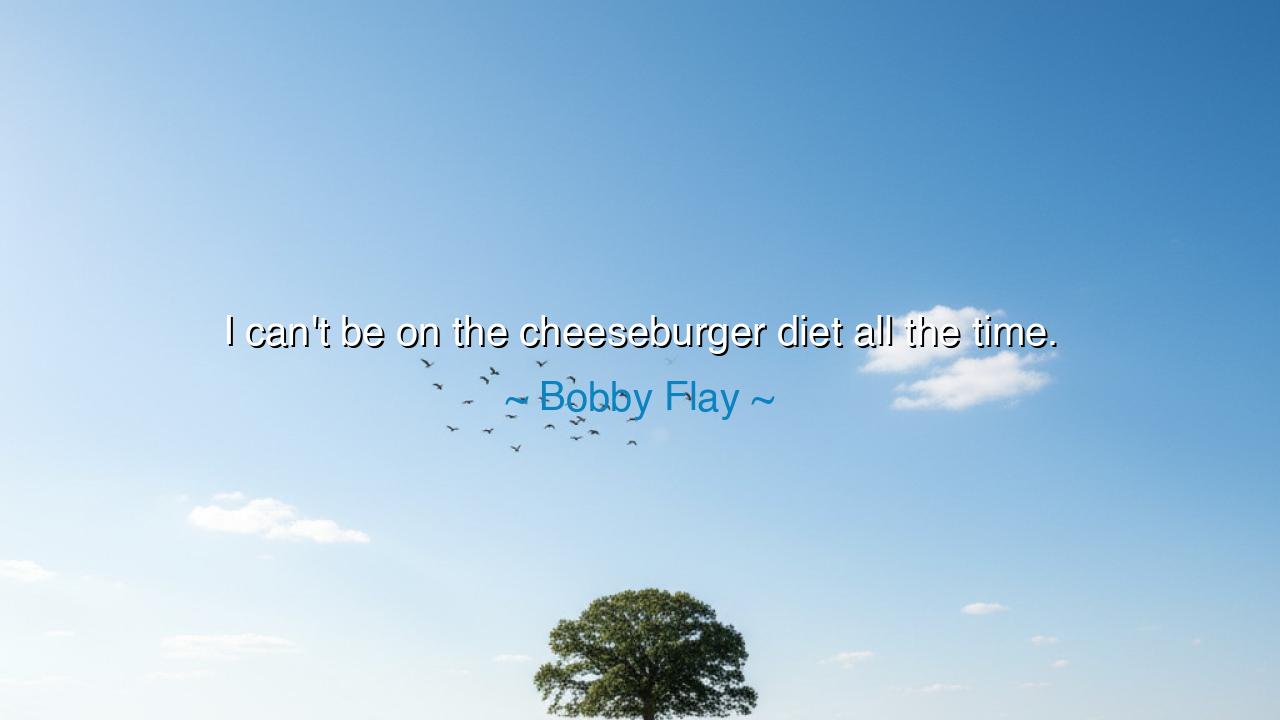
I can't be on the cheeseburger diet all the time.






In the simple, humorous words of Bobby Flay, there dwells a truth that is both ancient and profound: “I can’t be on the cheeseburger diet all the time.” Though spoken with a smile, these words carry the weight of moderation, balance, and self-awareness—the very pillars upon which wisdom has always rested. Beneath the jest lies a timeless principle: that indulgence, however pleasurable, must be tempered by restraint, for excess, when left unchecked, becomes its own form of hunger. The cheeseburger, symbol of comfort and satisfaction, becomes in this saying a metaphor for all worldly pleasures—those delights that nourish us for a moment, but enslave us if we do not master them.
Flay, a chef and craftsman of flavor, knows deeply the seduction of taste, of richness, of pleasure drawn from the senses. Yet even he, whose art is built upon indulgence, understands that joy without balance soon turns to burden. To live “on the cheeseburger diet all the time” is to live in pursuit of comfort alone, ignoring the body’s need for renewal and the soul’s need for discipline. His words remind us that life, like cooking, requires contrast—sweetness must be balanced by salt, richness by simplicity, indulgence by rest. The wise do not flee from pleasure, but they do not drown in it. They take joy in the feast, then return to stillness, understanding that true strength is born in balance.
The ancients knew this lesson well. Epicurus, often misjudged as a prophet of indulgence, taught instead the virtue of moderation. He said that pleasure itself becomes most profound when it is measured, when one enjoys not through excess but through gratitude. To eat a cheeseburger, to drink wine, to enjoy life’s flavors—these are not sins, but gifts. Yet to live only for such moments is to grow dull, both in body and in spirit. “He who is not content with little,” said Epicurus, “will not be content with much.” Flay’s quip, then, echoes this ancient wisdom: that fulfillment is not found in constant indulgence, but in the art of knowing when enough is enough.
Consider the story of Emperor Ashoka, ruler of a vast and powerful empire. In his youth, Ashoka was known for his excess—his hunger for conquest, his appetite for luxury, his indulgence in all things. Yet after the great and bloody war of Kalinga, he saw the futility of endless consumption and ambition. He renounced violence and devoted himself to compassion, simplicity, and spiritual nourishment. He discovered that the soul cannot thrive on indulgence alone. Just as the body weakens from overeating, so does the heart grow numb from excess comfort. Balance became his empire’s new law, and in that balance, he found peace.
So too does Flay’s statement speak to the modern age, where the cheeseburger diet is not merely food but a symbol of our times—fast gratification, instant comfort, endless consumption. We live in a world where abundance has become a kind of hunger, where pleasure pursued without pause leads to exhaustion rather than joy. His light-hearted admission becomes a gentle warning: that one cannot feast forever without losing the savor of the feast itself. To live well is to know when to indulge and when to abstain, when to act and when to rest. The ancients called this sophrosyne—the harmony of moderation, the grace of knowing one’s limits.
In his words, we also hear humility—the acknowledgment that even a master of food must bow to nature’s wisdom. The human body, like the spirit, thrives on variety and rhythm. Too much of one thing—no matter how good—disrupts the natural order. To seek strength, clarity, and longevity, one must learn the discipline of choice. The wise eater, like the wise soul, does not consume all he desires, but only what serves him. Flay’s jest is therefore not just about diet, but about self-mastery—the art of living in harmony with one’s needs rather than one’s cravings.
Let this then be the teaching drawn from his words: Do not despise pleasure, but do not be ruled by it. Enjoy the feast, but know when to lay down the fork. Take joy in what you love, but give your body and spirit room to breathe. For strength lies not in denial, but in balance; not in excess, but in rhythm. The world will always offer you its cheeseburgers—its comforts, its distractions, its sweetness. But the soul that learns to say, “Not all the time,” will taste life more deeply than the one that never stops eating.
And so, O seeker of wisdom, remember the lesson of Bobby Flay’s jest: the path to health and happiness lies not in endless indulgence, but in moderation guided by awareness. Let your pleasures be mindful, your appetites measured, your gratitude abundant. Feast when the time is right, fast when your body asks for rest, and above all, savor what you have. For the true banquet of life is not found in constant consumption, but in the ability to find joy in enough.






AAdministratorAdministrator
Welcome, honored guests. Please leave a comment, we will respond soon